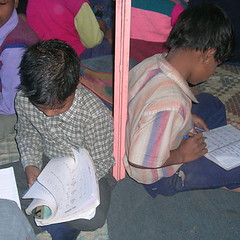
by Anuradha Bakshi | Dec 14, 2006 | reservations, two indias

We just have completed a socio-economic survey of all the pwhy children. Among the questions asked were the place of origin, education of parents and caste. We wanted to validate what we knew intuitively: more than 80% of our kids belonged to some reserved category or the other and none of the families had any certificate proving the same nor any knowledge of the now (in)famous reservation policy.
I write this post on the day the day the OBC reservation bill will be tabled in its original form despite the recommendation of the committee on keeping out the creamy layer, or at least giving them preference. Needless to say that none of our children belong to any creamy layer!
Many questions come to mind, but the one thing that stands out is that these kids can never get to any of the reserved seats. There are many reasons for that. First and foremost the likelihood of their finishing school is bleak. Even if they do, they will never get the certificate required to prove their social origin as the administrative requirements are impossible to meet. To name just one: forms need to be attested by two class I gazetted officer. I wonder how my poor parents would find one let alone two!
But something even deeper came to light while the survey was being one. People were very reluctant to reveal their caste and almost ashamed. Many hide behind generics like chaudhury and others append a high caste to their trade so we had rajput nais (barbers).
We spent time telling them about reservations and other benefits and finally did manage to get the information. Needless to say they were all eager to know how they could get a certificate and more than willing to do so. Some even said that if what we said was true, then they needed to pay more attention to the education of their kids..
I had begun this post saying that the reservation bill would be tabled today. Imagine my surprise when I heard that it had already been passed. Gone were the dissenting voices, the left and right issues all political parties had united to protect their vote banks. Foolish me to have felt surprised, every one was acting their part. Never mind the violence that might ensue, the deepaks that will lie in hospital unattended as young Indians take to the street..
A few weeks back a TV channel had canned a programme where many pwhy parents were caught on camera expressing their total ignorance of reservation policies. Somehow the story was never aired.. In it I had said that no young Indian with a heart and conscience would grudge reservation if it went to poor and disadvantaged children. What they resented was when those having had the same if not a better education and life got seats on a preferred system.
I still stand by that. Sadly that is not to be as the creamy layer has been included. The only way to fight this is for civil society to take a pro-active role and start a movement whereby all those who fall into reserved categories get the required certificates as a right and not a favour, and that their children get quality education so that they can stand in line for the seats that have been kept for them. A kind of a jail bharo movement where the numbers are so staggering that the administration and law makers are forced to think of alternatives.
If the powers that be want to divide India, then before we unite it again, maybe division has to be taken to an absurd end so that law makers realise that it is in their own interest to see unite it again.
This may seem ludicrous today, but give it a thought, it is just a matter of bringing things full circle
by Anuradha Bakshi | Dec 8, 2006 | ghaziabad girls, two indias
One week ago we were celebrating the rescue of the girls after a 24 hours vigil! Most of us would have liked them to come to Nirmal Chayya Delhi as initially planned. But, in spite of the presence of two autonomous central bodies. National Commission for Women, and the central reserve Police Force, reality struck: we were in Uttar Pradesh, a state known for all the wrong reasons.
One week ago people across India were watching the story unfold on TV and voicing their horror. It took the Supreme Court of India’s intervention to see that the girls were rescued and the abuser arrested.
A hearing was held on the 5th but the medical reports and the NHRC account was not ready. Slowly the media moved on to other things and the little girls once again became invisible. The nest hearing was for today. I searched desperately for some news but in vain. At 5 pm I called Anchal and was told that the hearing was again postponed.
We are all too aware of the ways our legal system functions but how can one not be disturbed by numerous questions that remain unsanswered. One cannot but remember the fact that for over 20 hours the girls and their abuser remained sequestered together, and wonder whether they were threatened.
The Supreme Court granted them security but one to be supervised by the administrator of a UP town; will the medical officer give a honest report. That the girls were ill treated dirty and lived in squalor was there for all to see. But what about the sexual abuse. This is no a rape case and remembering the contempt with which the swami dismissed the girls as being of bad character may lead to him being able to get away. He can simply say that they were abused by someone else!One of the persons who has visited the ashram every week shared another chilling fact; She was shown a register with 80 odd names. In her opinion there were about 60 odd girls when she first went, only 43 were rescued. Where are the missing girls.
We have launched a signature campaign mainly aimed at creating a support group and giving a voice to these girls.
Please join it
Powered by Qumana
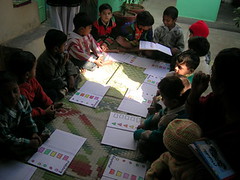
by Anuradha Bakshi | Nov 30, 2006 | two indias

Yesterday was my father’s 14th death anniversary.. It almost slipped my mind. Strange as there was a time when I almost lived for that day.. planning all kind of commemorative mush: flowers, rituals etc..
Wonder why the change: simply because of project why!
Mourning and grieving are luxuries you can pursue when you have time on your hand. But when your days are filled with positive endeavours, pain and memories recede and lose their angst. Yet if pwhy exists today it is because of the very man I once mourned with destructive passion so I guess he deserves to be remembered.
So what do you tell a man whose dying words to his fried were: do not lose faith in India!
When I look back on the 7 years of pwhy’s existence I see a lot of change and the micro level but the larger reality stills looks absurdly the same and are tiny achievements pale in front of the larger issues that glare at us from every direction.
Two roads again gape at me from the corner; the first is to continue the way we have gone and the other to start addressing larger issues. It is true that we could not have envisaged the later without having experienced the When we began our work, we were convinced that anyone doing such laudable things as us would have everyone accept if not help us. How naive we were. We soon learnt that doing good is the one thing that is anathema to many. If you dare touch the existing social equations you go against the agendas of many.
We have learnt and are still learning this the hard way as at every step we take, there are obstacles we need to overcome. What seemed positive when we began – children not dropping out for instance – today looks a bit jaded as you wonder what good will it do them in this cut throat society of ours. We have come to realise that education mans more than text book knowledge.
A recent survey done by a leading magazine showed that what ailed the education system was that it failed to teach children how to apply their knowledge to every day reality. If we are to be agent of changes, then children need to be taught how their rights and duties. they need to be made good and responsible citizens. Easily said than done when even poor and illiterate parents jump down our throats each and every time we try to do something that does not look like studies to them: environment programmes or any creative activity.
Our society is plagued by so many problems that it would need many miracles to start addressing them, but it needs to be done and maybe that is the personal pledge I need to take today in lieu of all the rituals and flowers
So be it!
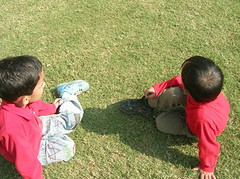
by Anuradha Bakshi | Nov 27, 2006 | two indias, utpal

Too many people are suffering
Too many people are sad
Too little people got everything
While too many people got nothing
We wile remake the world
With love and happiness
Remake the world
People, put your conscience to the test
Jimmy Cliff
Is this what these two little lads are singing. Maybe. Yet there is something wrong in this picture. Abhishek and Utpal should not be sitting together. If we had played by the rules, then one of them should have been far away in a dingy slum with his alky mom.
Yet today they sit side by side dreaming huge dreams in a world where everything is possible as no labels have been stuck to their heads yet.
Yes Sir, we are in India, in the one we all know, the one torn by caste, creed and shady agendas that hijack children’s hopes and aspirations.
Wonder where: in a little school tucked away on the fringe of the city, where the sun shines, and winds blow, where buffalos roam, and fields are green. Here children of all origins come together and discover each other. They learn, eat, play and sleep together and dream of remaking this world, their way.
When time is ripe for learning about labels, and differences, it will too late, or so I dare hope.
Powered by Qumana
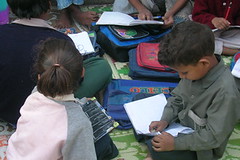
by Anuradha Bakshi | Nov 26, 2006 | common school, two indias

These little children sit on a wind swept terrace, on top of a tiny jhuggi overlooking a sea of slum dwellings in India’s capital city. A few days back they use to spend their times, roaming filthy lanes. Copy or slate in hand they wait for today’s lesson. A palpable energy pervades the little rooftop. A quick roll call proves that caste or creed is no bar here, the common denominator is learning!
Now what they will learn depends on the two teachers one a tribal the other a Muslim, an unlikely combination brought together by pwhy! They are willing to imbibe whatever they are taught.
A recent survey in a leading magazine proved that education in India, even if it is imparted in the best school, is way below international standards. What is excels in is learning by rote. Where it fails is in making connections. Hence though a child knows the composition of water, he/she is unable to give the composition of steam as he/she fails to make the link between the two. And the list is endless..
Today education is a number game with percentages rising to unbelievable heights and children cramming knowledge without often comprehending it let alone seeing its relevance in everyday life. I remember taking a class in the early days of pwhy where I asked class VII and VII children to identify one area where percentages played an important role. the lessons was about fractions. needless to say no one came with any answer and they were all surprised when I told them about sales whereby reduction were offered in percentages: 50% off, 20% saving etc.
I have always held that the Delors (UNESCO) four pillars of educations are essential to any sound education programme . They are:
Learning to know: Thinking abilities: such as problem-solving, critical thinking, decision-making, understanding consequences
Learning to be: Personal abilities: such as managing stress and feelings, self-awareness, self-confidence
Learning to live together: Social abilities: such as communication, negotiation, assertiveness, teamwork, empathy
Learning to do: Manual skills: practicing know-how required for work and tasks
Knowledge is useless unless the student has the ability to apply it to everyday situations. That is where our system fails us.
Unlike upmarket children, slum kids tend to start schooling at a much later stage. And unlike their rich counterparts, their living skills are tested at a very early stage. Tiny kids cross busy roads to shop for their mothers, or learn to fight for their rights when they are barely toddlers. I was surprised to see how a young five year old who had never learn arithmetic could account for the money given by his mother. I have seen little girls intuitively knowing what to do to soothe their howling sibling.
These children who by force majeure have to begin life using the 4 pillars we mention, quickly forget them as the enter the gates of a school. There the only thing they are judged is their ability to regurgitate the lesson.
Education is above all the ability to assimilate, analyze and then use the knowledge acquired and a self-respecting system should teach just that.
I will end this post by sharing a personal experience. When I sat for my French baccalaureate the history syllabus was the history from of the world from 1914 to present days. The final exam was summed up in one question: Had the allies lost the war, what in your opinion would have been the present economic scenario? (the year in question was 1967). Even if you had mugged up the entire book you would not have been able to answer the question if you did not have the ability to apply what you had learnt to a given reality. There was no right or wrong answer; you were judged by your ability to defend your opinion.
Therein lies the difference.
Powered by Qumana
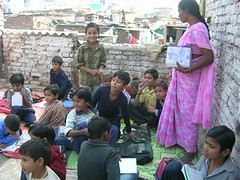
by Anuradha Bakshi | Nov 21, 2006 | two indias

We have a new primary extension in the back and beyond of the Govindpuri slums!
Sophiya and Israel were given the task of finding space and kids! Many may wonder why the need to add on a new primary centre. Once again it is all about comfort zones!
One could feel content with the 3 centres we had, they are running well and meet the numbers needed to satisfy those who help us and even get some kudos here and there. However in doing so, one negates the very principle and ethos of pwhy. One cannot forget that the mainstay of pwhy is to get communities to take on the responsibility of educating their children and to prove that not much is needed to do so. How can one forget the mind boggling figures that stare at us and mock us in this 60th year of independant India: 100 000 kids between 7 and 13 do not go to school , 76% SC students drop out of school… and many of those who make it, get paltry results.
Hence we decided to reach out to more children as the others seem to have settled.
S and I set out two weeks back to survey the vicinity of gali no 13 and to find space that would not be too costly. A tiny room was found and after a quick survey, classes began. In a matter of days the room was filled and the class moved on the terrace which could accommodate more children. Today, there are over 40 kids and many in the Q. A new centre was born @ the cost of 1000 rs/month, as the teachers were already part of the project!
A visit yesterday showed us beaming kids and proud teachers and proved once again that we were on the right path.










